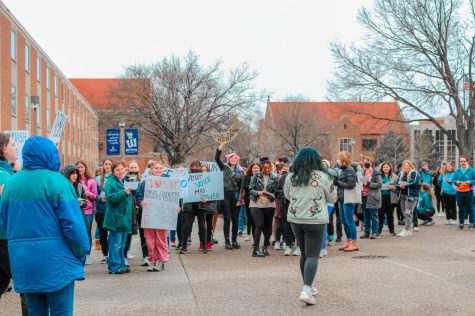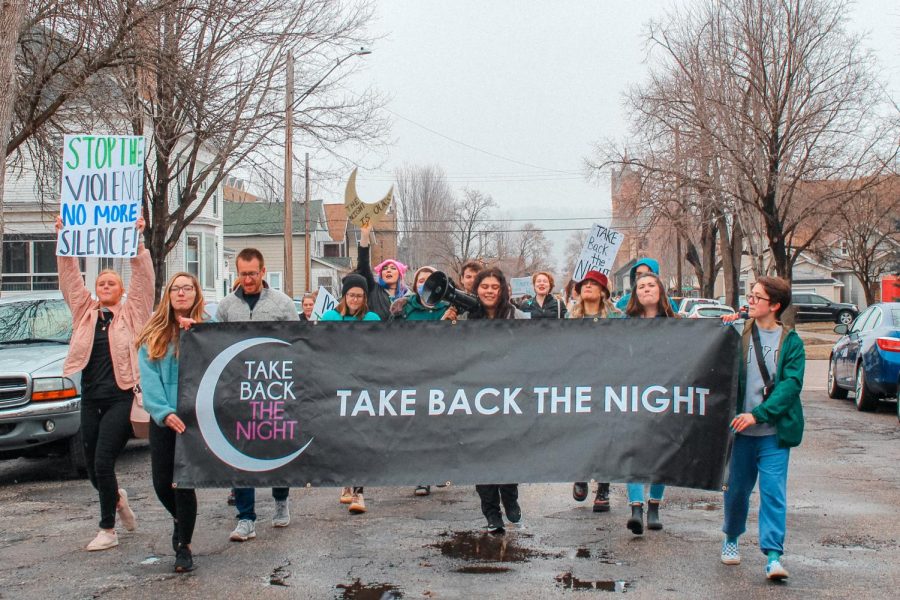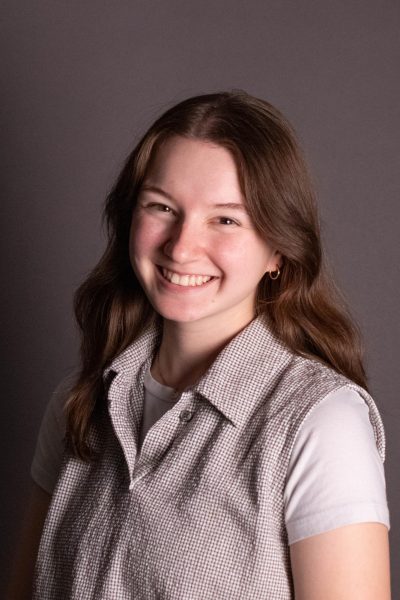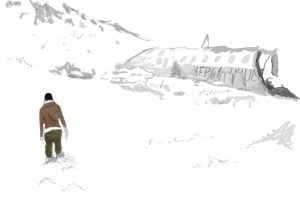‘Reclaiming our space’: Winona State community comes together for “Take Back the Night”
On April 7, 2022, at 5 p.m., the Women’s, Gender and Sexuality Department partnered with the Advocacy Center of Winona to organize the Take Back the Night event and march. The event started in the Science Laboratory Center with speakers and performers, and then the group made their way outside to march down Huff St. and through campus.
April 13, 2022
In commemoration of Sexual Assault Awareness Month, Winona State University’s Women’s, Gender and Sexuality Studies Department partnered with the Advocacy Center of Winona to host the annual “Take Back the Night” event on Thursday, April 7.
Due to poor weather conditions, the event was hosted in the Science Laboratory Center atrium on campus. This is where speakers, including the president of Black Student Union and Winona State University’s confidential advocate, among others, spoke about Sexual Assault Awareness Month and their support for the event. After these speakers and other student performances took place, including music and readings, the group made their way outside during the late afternoon’s flurries to march near Central Park.
Taylor Laur, a psychology major and women’s, gender and sexuality studies (WGSS) minor and one of the student organizers of the event, acknowledged the importance of the event on a larger scale, considering it is the earliest worldwide event to combat sexual and domestic violence in all forms.
“It’s a night for women as survivors to take back the night because most women don’t feel that it’s safe,” Laur said. “It’s reclaiming our space.”
![The event led the march to spread the hope and determination to reclaim and demand space as women and transgender survivors. Hale Appel, one of the organizers of the event, stated “That's a really big part of [Take Back the Night] too, is that we're taking up space for space that has been stolen from us.”](https://winonan.org/wp-content/uploads/2022/04/51998840215_1d094204ef_k-475x316.jpg)
This year’s “Take Back the Night” had a theme of “Our Ecosystems of Healing”, illustrating the multi-faceted levels of healing required to heal on a community level rather than individually. Plants were given out to anyone who wanted one to symbolize the act of growing through the healing process, which went hand-in-hand with the ecosystem theme.
Jessi Harvey Rigby, a sociology major with child advocacy studies and WGSS minors and another student organizer of the event, commented on the theme and how it relates to the event and sexual assault awareness month as a whole.
“It’s very symbolic of healing and growth,” Harvey Rigby said. “Similar to an ecosystem, plants have their ecosystem and they need so many different facets of support to survive, and not just to survive but thrive.”
When considering the importance of sexual assault awareness on a college campus, Harvey Rigby commented on the lack of conversation regarding sexual harassment and assault on campus unless you participate in certain courses such as WGSS courses.
The main conversation starter regarding sexual assault on campus seems to be the posters residing in bathroom stalls, which is not on the scale that many individuals on campus want sexual assault awareness to be.
“[Students in the WGSS Senior Seminar course] talked about how there’s this culture of silence in the community where [perpetrators] kind of encourage each other,” Harvey Rigby said. “Why isn’t there more encouragement and protection on the side of fighting against the violence?”
Cassidy Daniel, one of the executive board members for the reproductive justice club on campus and another student organizer for the march, commented on the importance of campus resources. Daniel stated how especially on a college campus, it is important to have teaching tools and adequate education on violence in all forms to push the efforts to prevent violence at Winona State. Having a confidential advocate on campus is a huge step in the right direction made just this school year, but more education is needed overall.
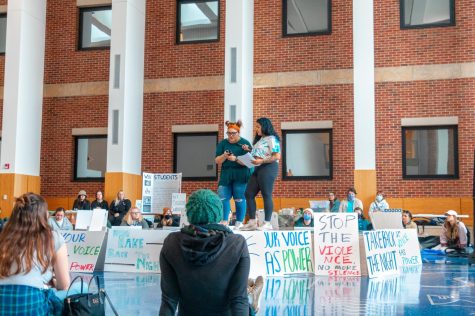
Adding to this sentiment, Harvey Rigby extended a question of whether WGSS courses should be required as a general credit.
“…the fact is that survivors are the ones who take [women’s, gender and sexuality] classes; the perpetrators are not in class,” Harvey Rigby said. “If we can’t make someone take feminism classes, we can’t help educate them in that way. You have to find other ways to force people to see it and hear it, too.”
Mary Jo Klinker, associate professor and director of the WGSS program, demonstrated the importance of the Advocacy Center of Winona and the WGSS program in “Take Back the Night”. Half of the students who organized the event are also trained advocates through the Advocacy Center of Winona and are committed to supporting survivors and spreading awareness.
One of the things the “Take Back the Night” organizers discussed was the theory of “Himpathy” by Australian philosopher Kate Manne. Rae Peter, English major and another organizer of the event, described “Himpathy” as “society’s tendency to empathize with a perpetrator, specifically a male perpetrator in a situation, and to push any sort of empathy to them rather than questioning their actions and taking away the empathy from the survivor.”
Hale Appel, psych major, WGSS minor and a student organizer of the event, tied the theory of “Himpathy” into the meaning and purpose of “Take Back the Night”. Appel explained when a sexual violence instance occurs, society tends to focus on the perpetrator and how their future is going to be impacted, rather than focusing on supporting and validating the survivor.
“People who feel vulnerable to sexual violence, often women, transgender individuals, etc., often don’t feel comfortable leaving their home at night because they don’t feel safe walking alone,” Appel said.“That’s a really big part of [“Take Back the Night”] too, is that we’re taking up space for space that has been stolen from us.”
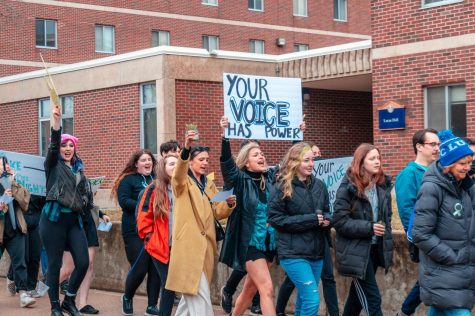
Despite the April snow the day of the event, a large turnout of students arrived in the atrium and marched down to Central Park and back, many equipped with signs declaring “Take Back the Night”, “Me Too”, “Stop the Violence, No More Silence” and more. The large group continued to take up their deserved space and demanded to be heard as they marched down Huff St. and around Winona State’s campus.
Also at the event was an interactive art piece where anyone could add a handprint atop painted vines to symbolize growth through healing. Other items were up for grabs too, such as pins, teal ribbons for Sexual Assault Awareness Month, Planned Parenthood pins/stickers and free contraceptives.
The organizers of the event were hoping for a large turnout; the group was not only large in number, but also in spirit. A sense of support, genuine welcoming and community was felt throughout the entire event, not just during the march or the artistic performances beforehand.
Taylor West, a psychology major with sociology and WGSS minors and another student organizer for the march, related the march overall to the feeling of community in Winona.
“…I think having a night to come together, no matter where you’re at in that process, is collectively healing,” West said. “Just the essence of being together.”
